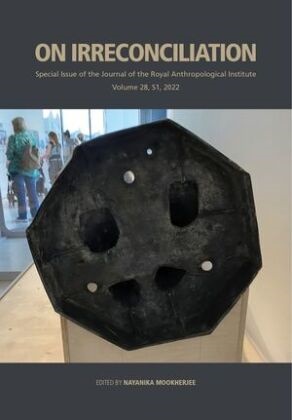Read more
Informationen zum Autor Nayanika Mookherjee is Professor of Political Anthropology and Co- Director of the Institute of Advanced Studies, at Durham University. Based on her book The Spectral Wound: Sexual Violence, Public Memories and the Bangladesh War of 1971 (2015), in 2019 she co-authored a graphic novel and animation film and received the 2019 Praxis Award from the Washington Association of Professional Anthropologists. Her research addresses gendered violence during conflict, debates on irreconciliation and transnational adoption. She has published extensively on anthropology of violence, ethics and aesthetics including editing and contributing to journal special issues on 'The Aesthetics of Nation' (2011) (with Christopher Pinney), 'The Self in South Asia,' (2013); Aesthetics, Politics and Conflict (2015) (with Tariq Jazeel). She has had fellowships with ESRC, Wenner-Gren Foundation for Anthropological Research, British Academy, Leverhulme and the Rockerfeller Foundation at Bellagio. In 2017, she co-founded and co-chaired Durham University's first Black, Asian and Minority Ethnic (BAME) staff and postgraduate students' network. Klappentext On Irreconciliation focuses on the less examined but frequent ethnographic instances when survivors refuse to forgive in response to persistent impunity of past injustices, particularly, in the face of absence-presence of the rule of law and staged processes of justice which serve the powerful.* An ethnographically-informed, interdisciplinary theorisation which makes irreconciliation visible in the contexts of Northern Ireland, Papua New Guinea, Mozambique, Bangladesh, Canada, Argentina, Sri Lanka, Colombia, USA and UK* Triangulates a discussion of the rule of law within processes of unresolved genocidal injustices, debates relating to statues of slave owners, racial prejudice and institutional responses* Contributors demonstrate the relationship of irreconciliation with law, aesthetics, temporality, resistance and the limits of the concept* Makes a theoretical and ethnographic case for irreconciliation as both a social and political phenomenon* Proposes an understanding of the past based on a positive commitment to 'irreconciliation' which might interest anthropologists, historians, philosophers, critical legal and political theorists, peace, conflict resolution and transitional justice scholars Zusammenfassung On Irreconciliation focuses on the less examined but frequent ethnographic instances when survivors refuse to forgive in response to persistent impunity of past injustices, particularly, in the face of absence-presence of the rule of law and staged processes of justice which serve the powerful.* An ethnographically-informed, interdisciplinary theorisation which makes irreconciliation visible in the contexts of Northern Ireland, Papua New Guinea, Mozambique, Bangladesh, Canada, Argentina, Sri Lanka, Colombia, USA and UK* Triangulates a discussion of the rule of law within processes of unresolved genocidal injustices, debates relating to statues of slave owners, racial prejudice and institutional responses* Contributors demonstrate the relationship of irreconciliation with law, aesthetics, temporality, resistance and the limits of the concept* Makes a theoretical and ethnographic case for irreconciliation as both a social and political phenomenon* Proposes an understanding of the past based on a positive commitment to 'irreconciliation' which might interest anthropologists, historians, philosophers, critical legal and political theorists, peace, conflict resolution and transitional justice scholars Inhaltsverzeichnis 1. Introduction - On Irreconciliation: Nayanika Mookherjee (Durham University) 2. Being held accountable: why attributing responsibility matters: Lisette Josephides (Queens University, Belfast) 3. Civil war and the non-linearity of time: Approaching a Mozambican politics of irrec...

